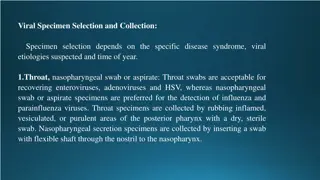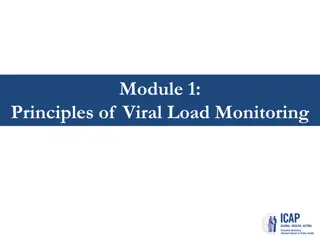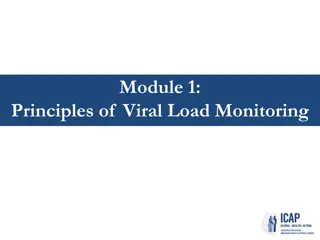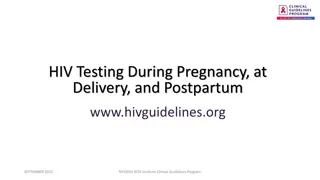Understanding Viral Vectors in Gene Delivery: Safety and Considerations
Exploring the mechanisms of gene delivery via viral vectors, this content delves into the basics of viral structure, infection, and replication. It discusses common viral vector systems like Adenoviral and Lentiviral vectors, highlighting safety considerations and the production processes involved.
1 views • 19 slides
Understanding How to Read a Load Chart for a 100-ton Crane
Load charts are essential for determining safe lifting capacities of cranes in construction and heavy machinery operations. This guide explains how to interpret load charts based on factors like boom length, operating radius, and load weight, ensuring safe and efficient crane operations. Learn to id
5 views • 7 slides
Uptake of Viral Load Testing and Viraemic Episodes During Pregnancy in Johannesburg, South Africa
This study investigates the uptake of viral load testing and frequency of viraemic episodes during pregnancy among HIV-positive mothers in Johannesburg, South Africa. Data from a cohort of mothers and infants born at a local hospital were linked to laboratory data for analysis. The results show the
2 views • 12 slides
Understanding Bridge Loading and Rating
Bridges are subjected to various types of loads such as dead load, live load, and other loads like wind and temperature effects. Dead load consists of the bridge's self-weight, while live load includes temporary moving loads. Bridges are rated to determine their load carrying capacity, especially in
0 views • 21 slides
- Development of Alternative Methodology for Default Road Load Parameters in Vehicle Testing
- The initiative to develop an alternative methodology for default road load parameters in vehicle testing was led by RDW and ACEA. The process involved multiple meetings, discussions, and proposals, resulting in the acceptance of the concept of a road load matrix family. Various x-factors were adop
2 views • 22 slides
Viral Genome Replication Strategies and Mechanisms
Viruses utilize different replication strategies to ensure the replication of viral genomes, packaging into virions, and potentially altering the host cell's structure or function. These strategies are vital for the virus to operate effectively within the host cell's constraints. The replication pro
0 views • 15 slides
Understanding LFLTF Load Shed Issues and Allocation Process
Explore the complexities of excluding CLR/Interruptible Load from a TDSP's EEA3 Firm Load Shed obligations and the necessary processes for managing load curtailment. Learn about the load shed allocation process, foundational assumptions, and a problem scenario involving load consumption during peak
1 views • 9 slides
Understanding Transmission Operator Obligations in Under-Frequency Load Shedding
ERCOT Compliance ensures that Transmission System Operators (TSOs) and Distribution System Operators (DSOs) have automatic under-frequency load shedding circuits in place to provide load relief during under-frequency events. The TSOs are required to shed a specific percentage of their connected load
0 views • 6 slides
Capability Maturity Model Cascade and Viral Load Testing Stages
This content discusses the Capability Maturity Model stages, focusing on process improvement and the stages of viral load testing demand creation. It outlines the evolution from initial to optimized stages and the development towards standardized processes in organizations. Additionally, it touches
3 views • 8 slides
Viral Specimen Selection and Collection Overview
Specimen selection for viral testing depends on the suspected viral etiologies and disease syndrome. Throat and nasopharyngeal swabs are used for different viruses, while rectal swabs, urine, blood, and tissue samples are also collected for specific viral detection. Proper specimen transport and sto
0 views • 7 slides
Uganda's Successes in Reaching Men with HIV Testing Through Assisted Partner Notification Program
Uganda has successfully implemented an Assisted Partner Notification (APN) program to reach men for HIV testing, addressing the gender gap in testing rates. By utilizing various approaches such as index testing, self-testing, and social network testing, Uganda has achieved significant success in tar
0 views • 12 slides
Paediatric HIV Testing and Treatment Guidelines
Understanding the importance of early diagnosis in HIV-infected infants and children is crucial for timely intervention and improved health outcomes. This session covers testing algorithms, initiation of antiretroviral therapy, viral load monitoring, and legal issues related to HIV testing in childr
2 views • 31 slides
Addressing Viral Load Suppression in Children with HIV: Insights and Recommendations
This study led by Dr. Geoffrey Chipungu, an HIV/AIDS Specialist at UNICEF ESARO, explores the rates, trends, and factors associated with HIV viral load suppression (VLS) in children. The research reveals sub-optimal VLS rates in children compared to adults, highlighting the need for improved policie
5 views • 12 slides
Understanding Viral Gastroenteritis: Causes, Symptoms, and Transmission
Viral gastroenteritis, commonly known as viral diarrhea, is a prevalent infection affecting mainly infants and young children. The disease is self-limiting, with symptoms like diarrhea, vomiting, and abdominal pain. Key viral etiologies include Rota viruses, Astroviruses, Norovirus, and Enteric aden
0 views • 19 slides
National Viral Hepatitis Control Program - Achieving Universal Health Coverage and Elimination Goals
The National Viral Hepatitis Control Program in India is working towards combating viral hepatitis and achieving SDG goal 3.3 through a comprehensive approach that includes awareness generation, prevention, management, and financing under the NHM. The aim is to eliminate hepatitis C by 2030, reduce
0 views • 19 slides
Software Testing Foundation Level: Testing Throughout the SDLC Quiz
Explore key concepts in software testing throughout the Software Development Lifecycle (SDLC) with a quiz covering topics like white-box testing in acceptance testing, component testing vs. system testing, and regression testing purposes. Enhance your understanding of testing methodologies with samp
5 views • 17 slides
Importance of Software Testing in Preventing Catastrophic Failures
Software testing is crucial in ensuring the reliability and safety of software systems, as highlighted by catastrophic failures such as the Ariane 5 rocket incident and the Therac-25 radiation therapy machine disasters. These examples underscore the importance of thorough testing in identifying and
1 views • 42 slides
Testing Approach in SCREAM for E3SM Fall All-Hands 2019
Major effort is focused on verification and testing in SCREAM for the E3SM Fall All-Hands. The initiative includes unit testing, property testing, regression testing, and leveraging various tools like Cmake, Python, Jenkins, AutoTester, and GitHub for Continuous Integration (CI). The emphasis is on
1 views • 21 slides
Zimbabwe Viral Load Clinic: Laboratory Interface Learning Session and Country Context Update
Zimbabwe hosted a vital learning session on viral load clinic laboratory interfaces and the epidemiology of HIV in the country. The session aimed to sensitize participants on the VL CLI, introduce the LARC team, and identify gaps in managing clients on ART with high viral loads. The country context
0 views • 18 slides
Viralizing YouTube Videos: Key Insights and Strategies
YouTube, a giant in user-generated video content, offers immense potential for videos to go viral. Understanding the dynamics of viralization on YouTube is crucial for content creators. This chapter delves into the phenomena of viral videos on YouTube, explores key factors that contribute to a video
0 views • 42 slides
Zimbabwe HIV Viral Load Testing Overview
Zimbabwe's plan to scale up HIV viral load testing from 2018 to 2020 is outlined, with targets set for each year. The country has made significant progress in expanding its viral load testing capacity, going from targeted testing to near-universal coverage by 2018. Various testing laboratories in Zi
0 views • 9 slides
Principles of Viral Load Monitoring in HIV Infection
Understanding viral load dynamics in HIV infection is crucial for managing treatment and transmission risks. Viral load monitoring helps assess response to antiretroviral therapy and identify treatment failure. Regular viral load testing is recommended for both adults and children on ART, allowing f
0 views • 40 slides
Fault-tolerant and Load-balanced VuFind Project Overview
Project Background: Part of the National Digital Library initiative, the VuFind project aims to provide a discovery interface for Finnish archives, libraries, and museums. It started development in 2012 due to the insufficiency of existing commercial products. The focus is on enhancing fault toleran
1 views • 19 slides
Cloud Load Balancing Overview and Requirements
This content provides a detailed overview of cloud-scale load balancing, involving components like servers, hypervisors, VMs, VIPs, DIPs, and the role of load balancers in distributing workloads efficiently. It also discusses communication flows involving VIPs, DIPs, front-end VMs, back-end VMs, and
0 views • 35 slides
Principles of Viral Load Monitoring in HIV Patients
Explore the dynamics of viral load in HIV infection, its impact on transmission and disease progression, response to antiretroviral therapy, identification of treatment failure, and monitoring schedules. Understand the significance of viral load testing in managing HIV patients effectively.
0 views • 47 slides
Dynamic Load Balancing in Block-Sparse Tensor Contractions
This paper discusses load balancing algorithms for block-sparse tensor contractions, focusing on dynamic load balancing challenges and implementation strategies. It explores the use of Global Arrays (GA), performance experiments, Inspector/Executor design, and dynamic buckets implementation to optim
1 views • 32 slides
Understanding Testing in Software Engineering
In the previous session, we discussed various aspects of software engineering, including modeling with UML diagrams, such as activity diagrams, use case diagrams, sequence diagrams, state diagrams, and class diagrams, as well as architecture patterns. Testing was emphasized as a key aspect, highligh
0 views • 35 slides
Understanding Determinants of Cell, Organ, and Tissue Tropism in Viral Pathogenesis
Cell, organ, and tissue tropism are crucial in viral pathogenesis, influenced by factors such as routes of entry and spread within the host, cell permissiveness, and immune responses. Viruses penetrate epithelial barriers through various mechanisms to establish infection, navigating specialized cell
0 views • 29 slides
Cost Allocation Strategies for Ancillary Services in Electricity Markets
Cost allocation for Ancillary Services (AS) in the electricity market involves distributing costs to Qualified Scheduling Entities (QSEs) based on load ratio share data. Two options are presented: one calculates separate hourly Real-Time Co-optimized Load (RCL) and Non-RCL Load Ratio Share (LRS) for
0 views • 5 slides
Understanding Gray Box Testing in Software Development
Gray Box Testing is a software testing technique that involves testing the software with partial knowledge of its internal workings. It combines aspects of White Box Testing and Black Box Testing, allowing testers to check both the presentation layer and the code part of an application. Gray Box Tes
0 views • 14 slides
Understanding Infectious Diseases: Approach, Prevention, and Viral Agents
Infectious diseases play a significant role in public health, with a focus on antibiotic stewardship, community-acquired and healthcare-associated infections, as well as various bacterial, viral, fungal, and parasitic agents. Specific topics include the prevention of infectious diseases, with a deta
0 views • 18 slides
Octavia Project Overview and Updates
Octavia is a network load balancing service in OpenStack that provides scalable, on-demand, and self-service access to load balancer services. The project has evolved to encompass all network load balancing and offers key features such as flexible network topologies, highly available load balancers,
0 views • 11 slides
Understanding the LARC Capability Maturity Model for Organizational Improvement
The LARC Capability Maturity Model (CMM) focuses on enhancing the viral load cascade, aiming to achieve better patient outcomes and improve institutional capabilities for viral load scale-up. Developed by Carnegie-Mellon University Software Engineering Institute in 1987, the CMM provides a structure
0 views • 14 slides
Guidelines for HIV Testing During Pregnancy and Postpartum
These guidelines recommend HIV testing during pregnancy, at delivery, and postpartum. Testing should be done early in pregnancy and again in the third trimester. Expedited testing during labor is required for certain patients, and syphilis testing is recommended. Pre-exposure and post-exposure proph
0 views • 18 slides
Association of Maternal Viral Load and CD4 Count with Perinatal HIV-1 Transmission Risk
Increased maternal viral load (MVL) and decreased CD4 cell counts have been linked to higher risks of perinatal and postnatal HIV-1 transmission during breastfeeding. The PROMISE Postpartum Component study examines the association between these factors and transmission risk, providing insights into
0 views • 15 slides
Guidelines for Virologic and Immunologic Monitoring in HIV Care
These guidelines aim to assist clinicians in utilizing HIV viral load testing and CD4 count monitoring effectively in HIV care. They provide recommendations on the appropriate timing of tests to assess ART responses, address adherence barriers, and manage resistance assays. Regular monitoring is cru
0 views • 12 slides
Understanding Unit Testing in Software Engineering
Concept Software is a discipline comprising various code pieces. Testing these codes together is complex but vital in Software Engineering. The process includes early testing like unit tests, pairwise/multiple component testing, module testing, integration testing, user tests, alpha tests, beta test
1 views • 6 slides
Exploring Viral Spread Through Mathematical Modeling
Guide providing insights into viral transmission and exponential growth through a mathematical model programmed in Google Sheets. Students explore the impact of reproduction numbers (R0) on viral spread and strategies for reducing transmission. The resource includes instructional strategies, discuss
0 views • 8 slides
Importance of Software and System Testing
Understanding the critical role of software and system testing in identifying and fixing errors before they lead to major failures. Various types of testing such as functional, usability, performance, and reliability testing are essential to ensure the quality of software products. Different classif
0 views • 52 slides
Understanding Viral Pathogenesis: Causes and Consequences
Viral pathogenesis involves the process by which a virus leads to disease, exploring the interplay between viral and host factors. It encompasses the concepts of virulence, viral disease, and the effects on infected cells and the host's immune response. Changes within infected cells, including cell
0 views • 26 slides







































